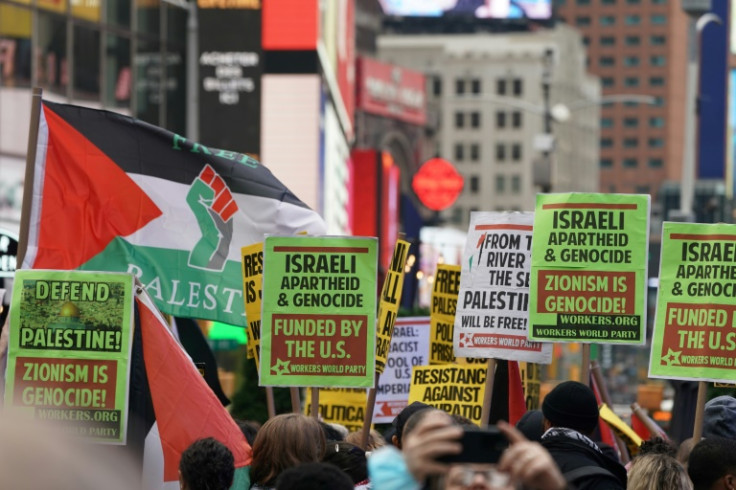'We Will Deport You': Trump Orders Crackdown on Pro-Palestine Supporters Holding Student Visas
Trump claims college campuses have become 'infested with radicalism like never before.'

College students are scrubbing the names and images of pro-Palestinian protesters from their online platforms following President Donald Trump's executive order to revoke the visas of students who publicly oppose Israel's invasion of Palestine. Trump claims the move will rid the country of 'Hamas sympathisers', but critics argue it is a direct violation of free speech.
A Violation of the First Amendment?
The Exponent, an independent newspaper at Purdue University, has announced it will remove the names, images, and likenesses of pro-Palestinian students published on its website after 7 October 2023. This decision, aimed at protecting students' identities, was described by the editorial board as a stand against what they called an 'autocratic attack on free speech'. The board denounced Trump's order as a 'blatant' violation of First Amendment rights, which guarantee freedoms of speech, assembly, and the press.
Purdue University has since clarified to DailyMail.com that it is unaffiliated with The Exponent, calling it an 'independent foundation'. Meanwhile, The Exponent's editor-in-chief, who primarily writes about social issues such as poverty and drug addiction, has reiterated the publication's commitment to protecting vulnerable students.
Trump's Executive Order and His Threat to Protesters
On 30 January, Trump signed an executive order cancelling visas for individuals in the U.S. who have expressed support for Hamas following the 7 October attacks in Israel.
Trump had previously signalled this move during his campaign, stating at a May 2024 rally: 'When I am President, we will not allow our colleges to be taken over by violent radicals. And if you come here from another country and try to bring jihadism or anti-Americanism or anti-Semitism to our campuses, we will immediately deport you.'
Just weeks into his second term, Trump announced plans for the Justice Department to aggressively prosecute those engaging in acts deemed terroristic, including arson, vandalism, and violence against American Jews. Additionally, he ordered the revocation of student visas for all 'Hamas sympathisers' on American campuses, claiming, 'They have been infested with radicalism like never before.'
For foreign students involved in 'pro-jihadist'—or pro-Palestinian—protests, Trump issued a stark warning: 'We will find you, and we will deport you.'
The executive order also grants federal agency leaders 60 days to submit recommendations on identifying anti-Semitic threats, though the exact measures remain unclear.
Antisemitism Nonprofit Praises Trump's Move
While critics argue Trump's order stifles free speech, some have welcomed the decision as a firm stance against antisemitism.
Elizabeth Rand, founder of Mothers Against College Antisemitism (MACA), a nonprofit inspired by Mothers Against Drunk Driving, created the group in response to Hamas' 7 October attack on Israel. MACA aims to address the rise of antisemitism on U.S. college campuses.
A day after Trump's second inauguration, Rand told MACA's 61,000 Facebook followers: 'We now have an executive order authorising the deportation of foreign students who support Hamas.' She shared a link to a tip line for U.S. Immigration and Customs Enforcement (ICE), encouraging members to report students or staff involved in pro-Palestinian protests.
With protests declining after the recent ceasefire announcement, identifying protesters has become more challenging despite Trump and MACA's efforts.
2024's Mass Pro-Palestine Protests
During last year's Israel-Hamas war, pro-Palestinian demonstrations intensified across U.S. universities, particularly at Columbia University. Protesters demanded institutions sever financial ties with Israel and called for an end to U.S. military support.
These demonstrations also deepened divisions within the Democratic Party, with President Joe Biden's support for Israel drawing criticism. Many believe this rift contributed to the Republican victory in the 2024 elections.
At the same time, antisemitism surged, with 83% of Jewish American college students reporting firsthand experiences with hateful rhetoric. This rise has fuelled calls for stronger measures against antisemitism on campuses.
Trump's Plans for Gaza Spark Outrage
Trump's latest executive order follows Israeli Prime Minister Benjamin Netanyahu's visit to the White House—the first foreign leader to meet Trump during his second term. During their discussions, Trump proposed occupying Gaza and transforming it into the 'Riviera of the Middle East'.
He also urged Israel and Hamas to maintain a ceasefire while negotiations to end the war take place. However, the announcement was met with fierce criticism, with opponents warning it could amount to colonisation and exacerbate Gaza's already dire situation.
Trump's Ongoing Pro-Israel Stance
This is not Trump's first move in support of Jewish Americans. In 2019, he signed an executive order expanding the Civil Rights Act to include discrimination based on antisemitism, barring such behaviour in federally funded programmes.
Some Republicans attempted to use this order to withdraw federal funding from universities that permitted pro-Palestinian demonstrations, arguing that these protests were evidence of liberal bias in higher education.
On 29 January 2025, just a week after taking office, the White House outlined further measures to combat antisemitism, reaffirming Trump's long-standing commitment to the issue. His administration's actions have been widely supported by his base, who see him as a steadfast ally of Israel.
Balancing Free Speech and Fighting Antisemitism
Addressing antisemitism is essential for fostering a safer and more respectful society. However, it is equally vital that efforts to curb hate do not infringe upon the fundamental right to free speech. In times of political tension, allowing space for diverse perspectives is a cornerstone of democracy—one that must be upheld even in the face of controversy.
© Copyright IBTimes 2025. All rights reserved.






















